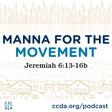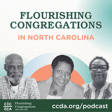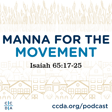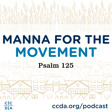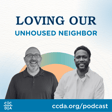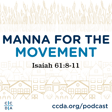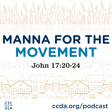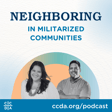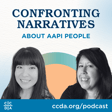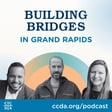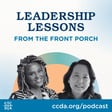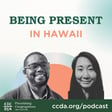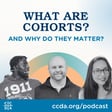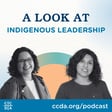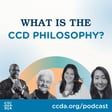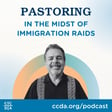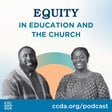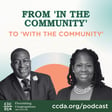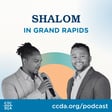Become a Creator today!Start creating today - Share your story with the world!
Start for free
00:00:00
00:00:01

How To Build The Engaged Board Your Organization Needs
Jonathan Haskell, Matthew Best, and Daniel Watson share about how to recruit, assess, and encourage your Board of Directors. Taken from the 2021 CCDA National Conference.
Recommended
Transcript
Recruitment Transparency
00:00:03
Speaker
please do this when you're making these recruitments.
00:00:04
Speaker
Do not minimize the ask.
00:00:06
Speaker
Don't say, oh, it doesn't take a whole lot.
00:00:08
Speaker
You just meet once every other month and all that kind of stuff.
00:00:10
Speaker
No, you tell them what they're getting into because I will tell you, if you minimize the ask, that's what you're going to get.
Podcast Introduction
00:00:17
Speaker
And welcome to the CCDA podcast.
00:00:19
Speaker
In today's episode, how to build the engaged board your organization needs.
00:00:25
Speaker
Hosted by Jonathan Haskell, Matthew Best, and Daniel Watson.
00:00:28
Speaker
Take it from the 2021 CCDA conference.
00:00:32
Speaker
We join their session in progress.
00:00:36
Speaker
Good afternoon, everyone.
00:00:37
Speaker
We hope that you are okay.
00:00:39
Speaker
We hope that you are fed, that you are satisfied.
00:00:43
Speaker
If not, feel free to keep eating and everything.
00:00:46
Speaker
We are okay with that.
00:00:47
Speaker
Welcome to our workshop.
00:00:49
Speaker
My name is Matthew Best.
Matthew Best's Introduction
00:00:51
Speaker
I am from Knoxville, Tennessee.
00:00:52
Speaker
All of us are from Knoxville, Tennessee.
00:00:54
Speaker
I work at Johnson University where I do two pretty cool things.
00:00:58
Speaker
I am the director of the Future Hope Institute at Johnson University.
00:01:01
Speaker
It is a youth theology institute where we teach high school kids about faith and justice.
00:01:05
Speaker
And I'm also the director of multicultural student affairs at Johnson University.
00:01:09
Speaker
So it's a pleasure to be with you all.
00:01:10
Speaker
I'll be back with you here in just a moment.
00:01:14
Speaker
Hey,
Jonathan Haskell's Role
00:01:15
Speaker
everybody.
00:01:15
Speaker
My name is Jonathan Haskell.
00:01:17
Speaker
I'm the executive director of Yoke Youth Ministries.
00:01:20
Speaker
Yoke has been around the Knoxville area for almost 50 years.
00:01:23
Speaker
We've got volunteer mentors doing after-school programming at 31 middle schools in six counties.
00:01:30
Speaker
I also serve as the local connector for the Knoxville Local Network, which is just a lot of fun.
00:01:37
Speaker
We were explaining to someone how we all do different jobs, but
00:01:41
Speaker
So kind of becoming an official local network for CCDA was just a formality.
00:01:47
Speaker
It kind of formalized what we were already doing in relationship
Yoke's Board Diversity
00:01:50
Speaker
with each other.
00:01:50
Speaker
So a lot of blurred lines in our ministries and work together in the neighborhoods.
00:01:56
Speaker
I want to point out before I hand over to Daniel.
00:02:00
Speaker
Daniel and I have been working this process for quite a few years.
00:02:04
Speaker
I've been using it for five years with my organization.
00:02:06
Speaker
Daniel's been using it for closer to ten.
00:02:09
Speaker
When I took over with Yoke, we had six board members.
00:02:12
Speaker
All six were white.
00:02:14
Speaker
Five were male.
00:02:15
Speaker
One was female.
00:02:16
Speaker
The female was related to one of the staff members, which is a whole other story.
00:02:22
Speaker
Two of those guys had been serving on the board for more than 20 years.
00:02:26
Speaker
So all of this was in opposition to the bylaws that the organization had established.
00:02:33
Speaker
They just had gotten to a place where they were stuck.
00:02:36
Speaker
And so one of the first things we did, we started implementing this program.
00:02:40
Speaker
Now, five years later, I've got a board of 14.
00:02:45
Speaker
The last original board member just rotated off this year.
00:02:49
Speaker
We've got of those 14, probably six are female.
00:02:53
Speaker
We've probably got six or seven African-Americans and we've got three under the age of 30.
00:02:59
Speaker
So we've got some good ethnic.
00:03:01
Speaker
We're not where we want to be yet, but we've got some good ethnic, gender and age diversity.
00:03:06
Speaker
And excited to share this this model
Technical Model for Board Development
00:03:10
Speaker
with you.
00:03:10
Speaker
It's a very technical, very specific model that we're going to be sharing with you.
00:03:15
Speaker
I don't expect anyone to walk away today having mastered it.
00:03:19
Speaker
What we're hoping to do is to introduce it to you.
00:03:22
Speaker
And then Daniel and I both, we're happy for you to take our information.
00:03:26
Speaker
Happy to talk to any of you on the phone or email.
00:03:30
Speaker
We could even talk about maybe an in-person visit or Zoom.
00:03:35
Speaker
Any way that we can help you kind of begin to use this process in your own ministries, we'd be happy to do that.
00:03:43
Speaker
I wish more than anything that we had time to go around the room.
00:03:46
Speaker
I'd love to hear where you guys are and your board.
00:03:48
Speaker
I heard a comment here.
00:03:49
Speaker
She's having her first board meeting December 2nd.
00:03:53
Speaker
So that I'd love to hear where all of you are.
00:03:56
Speaker
We don't have time to do that today, but we want to share with you what this process has done for us and for our organizations and then help you implement that if possible.
00:04:08
Speaker
Thanks, Jonathan.
00:04:09
Speaker
Yeah, so I'm Daniel
Daniel Watson and Restoration House
00:04:10
Speaker
Watson.
00:04:10
Speaker
I am the, they wanted to invite, make sure they had a short, bald, white guy to come with them.
00:04:15
Speaker
So since they got all the height and the hair and all that, the looks and all that kind of stuff.
00:04:20
Speaker
So I'm thrilled to be with you all.
00:04:22
Speaker
My wife and I started an organization 14 years ago called the Restoration House in Knoxville, Tennessee.
00:04:28
Speaker
We work with mother-led families.
00:04:30
Speaker
We walk with them in community and have developed a neighborhood and do social capital work and family advocacy and
00:04:36
Speaker
youth development work through a partner called Emerald Youth Foundation.
00:04:40
Speaker
And I do a lot of nonprofit consulting, and one of the reasons why I do that is because as a person that is trying to be kingdom first, I know that none of us in this room lack for passion.
00:04:51
Speaker
I mean, I'm making that strong assumption that none of us do.
00:04:56
Speaker
But we also, what I fundamentally believe is that to the degree that we can run really well-oiled organizations, it will maximize our impact.
00:05:05
Speaker
And the reality is none of us got into this work to do board development.
00:05:08
Speaker
I don't think, right?
00:05:09
Speaker
None of y'all got into this work to do board development.
00:05:12
Speaker
But as a person who started an organization, and my wife and I have never been on our board, we've never had a single vote in the organization.
00:05:19
Speaker
The reason we did that is because we want this work to way outlive us.
00:05:22
Speaker
Well, the only way that will happen is to the degree that our board can carry it on, right?
00:05:27
Speaker
And so that's why I think this type of process is so extremely important.
Board Development Myths
00:05:32
Speaker
I'm also just finished my first year as an elected city or elected school board member.
00:05:38
Speaker
We got about 60,000 students in our system and 89 schools.
00:05:42
Speaker
So pray for me, y'all, because if y'all been tracking with school boards, it's a hot mess out there right now.
00:05:47
Speaker
And I will tell you, school boards have no interest in doing anything like this.
00:05:51
Speaker
There's no interest right now, it doesn't seem like, in good governance and putting kids first.
00:05:56
Speaker
So hopefully you all can not do some things some of our school boards are across the country and implement a good process to really center the people that you're coming alongside.
00:06:07
Speaker
So it's an honor to be with you, and we're going to talk just real quickly about the objectives that we want to make sure that you all leave with.
00:06:13
Speaker
We want you to gain an understanding, first and foremost, of board development.
00:06:16
Speaker
I know John and I believe that it's the thing that you really, if you're a leader of an organization, executive director, CEO, that kind of thing, it's one of those things that you really need to wake up kind of every day thinking about.
00:06:27
Speaker
It's not one of those things you get to check out of.
00:06:29
Speaker
Board development is central.
00:06:31
Speaker
We want you to gain an understanding of some of those myths around board development.
00:06:35
Speaker
Matthew's going to take you through some of that.
00:06:37
Speaker
There's a lot of myths that are flying around out there.
00:06:40
Speaker
And we want you to learn a proven model.
00:06:42
Speaker
So John mentioned that his group's been doing this for about five years.
00:06:46
Speaker
Mine's been doing it about 10.
00:06:48
Speaker
There's probably 15 at least other organizations in Knoxville who use this process.
00:06:53
Speaker
It's become kind of a best practice model in our community.
00:06:57
Speaker
And so...
00:06:59
Speaker
It's a process, one of many, so glean the things that you can.
00:07:02
Speaker
And like Jonathan said, at the very end, we're going to give you a QR code that's going to give you all the detail and links and everything that you could possibly want or imagine to be able to implement the process in your setting.
00:07:15
Speaker
There's a program in Knoxville at the University of Tennessee called the Consortium for Social Enterprise Effectiveness, which is way too long of a name.
00:07:23
Speaker
But that's been going on for about 10 years.
00:07:25
Speaker
They even teach this model now through the University of Tennessee, and it's something that we've kind of been bringing up.
00:07:31
Speaker
Thanks, Daniel.
00:07:34
Speaker
Let me grab my countdown clock.
00:07:36
Speaker
I'm officially the timekeeper, so it's weird when the black preacher is the one keeping the white folks from talking too long.
00:07:42
Speaker
Thank you.
00:07:43
Speaker
Anyway, anyway, so, yeah, thank you.
00:07:47
Speaker
All right, so quick question because we do want to be a little bit interactive here.
00:07:50
Speaker
We want to talk.
00:07:50
Speaker
We want to hear from you guys.
00:07:52
Speaker
I do want to start with this question.
00:07:53
Speaker
When you hear the words board of directors, what do you hear?
00:07:58
Speaker
And just yell at me, holler at me, talk to me.
00:08:00
Speaker
What do you think about when you hear the phrase, the term board of directors?
00:08:04
Speaker
Control.
00:08:05
Speaker
Who said it?
00:08:05
Speaker
Somebody said it.
00:08:07
Speaker
Old people.
00:08:08
Speaker
Okay.
00:08:08
Speaker
Yeah.
00:08:12
Speaker
So you said stale, male.
00:08:13
Speaker
What was the other one?
00:08:18
Speaker
I will be stealing that one for sure.
00:08:21
Speaker
Somebody else.
00:08:21
Speaker
Yes, ma'am.
00:08:23
Speaker
You said tired volunteers.
00:08:26
Speaker
Somebody said money.
00:08:27
Speaker
Money.
00:08:27
Speaker
Okay.
00:08:28
Speaker
Somebody else.
00:08:29
Speaker
What else do you think about when you're board of directors?
00:08:31
Speaker
You said what?
00:08:33
Speaker
Our boss.
00:08:33
Speaker
Our boss.
00:08:33
Speaker
Okay.
00:08:36
Speaker
Okay.
00:08:36
Speaker
Awesome.
00:08:37
Speaker
You can tell you're young.
00:08:38
Speaker
But it's good.
00:08:39
Speaker
You should be thinking that way.
00:08:40
Speaker
He said college clubs and organizations.
00:08:43
Speaker
I said yes.
00:08:44
Speaker
That's good.
00:08:44
Speaker
Say it again.
00:08:46
Speaker
Power.
00:08:46
Speaker
Okay.
00:08:46
Speaker
Yeah.
00:08:47
Speaker
So the board of directors, it engenders all these thoughts.
00:08:52
Speaker
Some of what you shared was negative, but I think sometimes what the directors brings up for us is the work that we don't really want to do, right?
00:08:58
Speaker
We think so much about the program being the program and the board of directors being just a necessary evil.
00:09:04
Speaker
But I'm hopeful that after this presentation, after you go through this process, you'll realize that it doesn't have to be that, right?
00:09:09
Speaker
There's ways that you can do it.
00:09:11
Speaker
There's ways we can talk about it.
00:09:12
Speaker
There's ways we can focus on building the structural part of our organizations that does not have to make this tedium or a necessary evil, okay?
00:09:20
Speaker
One more question for you.
00:09:22
Speaker
When you think about board development, what comes to mind?
00:09:26
Speaker
Is it the exact same words you just said or is it something else?
00:09:28
Speaker
Training?
00:09:29
Speaker
Okay, say more about that.
00:09:30
Speaker
Did y'all hear her in the back?
00:09:31
Speaker
She said it means taking the board and helping to shape it and helping people to catch the vision and figure out not just the organization, but what are they really here to do?
00:09:40
Speaker
So I love that.
00:09:41
Speaker
That's great.
00:09:42
Speaker
Somebody else, when you hear board development, what do you think of?
00:09:45
Speaker
diversity of experiences, talents, and cultures.
00:09:46
Speaker
I'll hand behind you.
00:09:48
Speaker
Okay, awesome.
00:09:48
Speaker
Yes, sir.
00:09:49
Speaker
Expanding influence.
00:09:50
Speaker
Can you add a little bit more to that for me?
00:09:52
Speaker
I love that.
00:09:53
Speaker
I love that.
00:09:53
Speaker
Anybody else?
00:09:54
Speaker
Okay, you're getting ahead of yourself, brother.
00:09:56
Speaker
You're getting ahead of yourself.
00:09:57
Speaker
That's going to come up in a little bit, but that's awesome.
00:09:59
Speaker
That's good.
00:10:00
Speaker
So, yeah, so the biggest thing, like I said, we just don't want you to think of these things as negative things.
00:10:05
Speaker
We don't want you to be sighing when you think about it.
00:10:06
Speaker
We want you to be excited as you think about that next board meeting.
00:10:09
Speaker
And we want you to think about the opportunities and the possibilities that this process will allow you.
00:10:14
Speaker
But before we get to the process that Jonathan and Daniel are going to so eloquently take you through, we have to address some other things real quick, right?
Thoughtful Board Recruitment
00:10:22
Speaker
We have to address some myths.
00:10:23
Speaker
And here's a big myth.
00:10:24
Speaker
How many of y'all have heard the myth of a warm body?
00:10:27
Speaker
We just need somebody to fill the spot.
00:10:29
Speaker
Y'all ever struggle with that?
00:10:31
Speaker
Especially when sometimes you have you don't always have access to the pool of people just readily available that you want.
00:10:37
Speaker
And you're like, we got to fill this spot.
00:10:39
Speaker
We can't leave this spot open.
00:10:40
Speaker
We got to just find somebody who's willing.
00:10:42
Speaker
Right.
00:10:43
Speaker
I think a lot of times, you know, a lot of my background is in church ministry and church leadership.
00:10:47
Speaker
And a lot of times, especially if you're in a smaller black church in particular, we just need somebody who's going to show up.
00:10:52
Speaker
We need the person that's willing to say yes to show up and to do the thing, right?
00:10:56
Speaker
But, you know, fortunately, we don't have to allow the way we do board development to be that.
00:11:01
Speaker
So we need to throw away the myth of the warm body.
00:11:06
Speaker
We just need the person.
00:11:07
Speaker
We just need someone that's available.
00:11:09
Speaker
We can do better than that, right?
00:11:10
Speaker
We can think and we can dream beyond that.
00:11:12
Speaker
So let's get past the myth of just having a warm body in the spot.
00:11:18
Speaker
The next one, we need to get past the myth that board development happens once a year.
00:11:24
Speaker
Board development has got to be a part of our natural rhythms as we think about our organizations.
00:11:29
Speaker
We think about the spaces that we work in and that we serve in.
00:11:32
Speaker
And again, if you change your approach to this, you change your mindset to this, it's a lot easier to tackle this when you realize that your board
00:11:40
Speaker
are people that are going to be so important to your organization because they're not just raising money, they're not just voting, they're not just making decisions, they're addressing organizational culture, but also, I want you to think of your board of directors as also being people that empower you as either the leader or the staff person.
00:11:56
Speaker
There's ways in which the right board and the relationships that are cultivated there can actually be some of the things that sustain you in your leadership and in your ministry.
00:12:05
Speaker
Your board should not just be a drain on you, but it should be something that adds value to you.
00:12:09
Speaker
And if you work these steps and you work this process, I really think God can do a lot in these boards to really bless you as a leader or as a staff person.
00:12:18
Speaker
Does that make sense?
00:12:19
Speaker
Can I get an amen on that?
00:12:20
Speaker
Because if we're built to live in a relationship, then it makes sense that we should also be blessed by the relationship of the people we work with on our boards.
00:12:26
Speaker
All right.
00:12:28
Speaker
So we also have to think that it can't just happen once a year.
00:12:30
Speaker
If that's who they're going to be, then that means I'm thinking about this constantly.
00:12:34
Speaker
I'm thinking about this regularly, who I want to be on this board and what we want them to do.
00:12:40
Speaker
Third thing, and you said it back there, one of the myths is we need board members to help us today.
00:12:46
Speaker
Now, that can be really tempting when you're dealing with a crisis.
00:12:50
Speaker
Am I right?
00:12:51
Speaker
Crisis a lot of times gets us to be so short-sighted that we don't think about the future and what's coming next.
00:12:57
Speaker
And so we're constantly saying, who do I need right now?
00:12:59
Speaker
You might have a financial deficit that you're thinking about as an organization.
00:13:03
Speaker
Your immediate thing is I need somebody to either give money right now or they can raise money right now.
00:13:08
Speaker
But that person may not be a great fit for your board long term.
00:13:12
Speaker
They may not help you see what the next phase is.
00:13:15
Speaker
And if you keep doing that, you might end up in the same spot you're in now 10 years from now because you keep getting the same board members.
00:13:21
Speaker
So we need to think about...
00:13:23
Speaker
We don't just need board members to help us today.
00:13:25
Speaker
We need folks that are going to help us five years from now, ten years from now.
00:13:29
Speaker
We need people for whatever our rhythms are or our limits are, we need to think that far in advance.
00:13:34
Speaker
We need to think about that person's entire tenure with the board, not just the here and now.
00:13:39
Speaker
And then finally, a lot of times when we're recruiting members, we kind of recruit members like it's a checklist.
00:13:45
Speaker
We're like, well, we don't have enough of this, so I need to just go get this.
00:13:49
Speaker
And while I am quite the proponent of affirmative action, those types of things,
00:13:56
Speaker
Sometimes the thinking that's associated with that, especially with your boards, can sometimes get you in the wrong spot.
00:14:02
Speaker
You say, we just need this.
00:14:04
Speaker
And so you don't actually end up with the right this.
00:14:07
Speaker
Amen.
00:14:07
Speaker
Sometimes you end up saying literally, especially if you're a predominantly white organization and you don't have a lot of diversity in terms of ethnic stuff, you will sometimes just take the first black person that express interest or the first black person that says yes or the first black person that you meet because you might not know any.
00:14:22
Speaker
I don't know.
00:14:23
Speaker
No judgment.
00:14:23
Speaker
No judgment.
00:14:24
Speaker
But it's not about just getting the need or just filling these gaps whether it relates to race.
00:14:30
Speaker
It's the same thing whether it relates to occupation.
00:14:34
Speaker
Just because y'all don't have an accountant on the board doesn't mean that you need to go get the first accountant that you see.
00:14:39
Speaker
You're going to want to find people that Jonathan's going to talk about people that can fit in multiple boxes.
00:14:44
Speaker
And again, you want to work the process.
00:14:47
Speaker
I coach basketball.
00:14:49
Speaker
I coach track for a number of years.
00:14:50
Speaker
I was a track athlete in college.
00:14:51
Speaker
You can't tell now, but I was.
00:14:53
Speaker
And then I coach basketball.
00:14:55
Speaker
And one of the things that's so hard about coaching is getting folks to work the process because all they want to get to is the end result, right?
00:15:02
Speaker
All I want to do is score.
00:15:03
Speaker
All I want to do is jump.
00:15:04
Speaker
All I want to do is run faster.
00:15:06
Speaker
But it's like, no, no, no.
00:15:07
Speaker
I need you to work the process because that's going to last for you.
00:15:10
Speaker
That's going to get you even further than you think right now, right?
00:15:12
Speaker
Right.
00:15:13
Speaker
And so I think the same thing can be true as we're looking at recruiting members.
00:15:16
Speaker
We don't need to look at just who's missing right now.
00:15:19
Speaker
We need to also be thinking with the long term in hand, and that's going to ultimately get us to the exact people that we need on our boards.
00:15:26
Speaker
And then finally, this one I think is another huge one.
00:15:30
Speaker
You cannot trust the members you have to be your only real recruitment tool or strategy for your board members.
00:15:37
Speaker
Why is that a problem?
00:15:38
Speaker
Somebody tell me, why do you think there might be a problem if you're just relying on your current board members to recruit new board members?
00:15:43
Speaker
What issues might that create for you?
00:15:44
Speaker
Yes, my friend.
00:15:45
Speaker
That's right.
00:15:46
Speaker
That's right.
00:15:47
Speaker
If you've got a whole board and all they do is they're older white men like to hunt and fish and they're like hanging out with other board members that hunt and fish, who are they going to recruit to be the new board members when it's time we get a new one?
00:15:58
Speaker
And that's not even like a shot at them.
00:16:01
Speaker
That's just who we are as people.
00:16:02
Speaker
We typically recruit people that we want to hang out with and that are like us and that make us feel comfortable.
00:16:08
Speaker
We don't really recruit people or are in relationship with people that stretch us and they create dissonance for us.
00:16:14
Speaker
So what that means is that yes, I love the board members I have now.
00:16:18
Speaker
Yes, I love the people that are serving and that are active, but I cannot rely solely on them to be the next people to recruit our next group in.
00:16:26
Speaker
I've got to search outside of them.
00:16:28
Speaker
It's the same thing we talk about in other spaces when it comes to how we search for employees or search for new hires and things like that.
00:16:34
Speaker
We can't just keep using the same networks, otherwise we end up with the exact same results.
00:16:38
Speaker
All right?
00:16:39
Speaker
So just a few myths of board development that we need to kind of combat, and what you're going to hear in the process from here on out is going to speak directly to a lot of these myths that we're talking about.
00:16:51
Speaker
All right?
00:16:52
Speaker
So I'm going to hand you over to Jonathan to take you deeper into the process.
00:16:58
Speaker
We'll be right back.
00:16:58
Speaker
But first, a word from our sponsor.
00:17:01
Speaker
Hello, I'm Paul Miles, president and CEO of We Raise Foundation.
00:17:05
Speaker
We Raise invests in people and organizations that serve at the intersection of poverty, violence, and inequality.
00:17:12
Speaker
We start by acknowledging that change begins with we.
00:17:15
Speaker
We are in this together, and it's going to take our love and our compassion and dedication to solve the problems facing communities today.
00:17:24
Speaker
We invite you to be part of that with us.
00:17:26
Speaker
and encourage you to visit WeRaise.org to find out how you can become involved and be a partner with WeRaise.
Planning in Board Development
00:17:35
Speaker
So phase one of the board development, or stage one of board development is planning.
00:17:42
Speaker
I'm not going to spend a whole lot of time here because that's not the focus of this workshop.
00:17:50
Speaker
But when I think about developing the kind of board that your organization needs, there's really two kind of twin pillars that we want to talk about.
00:17:58
Speaker
We're going to spend more time on the second one.
00:17:59
Speaker
But the first pillar is you've got to have a plan, right?
00:18:03
Speaker
It goes back to that myth of, I want people that can help me today.
00:18:07
Speaker
You've got to know where your organization is going.
00:18:10
Speaker
You've got to have some kind of idea of where I want to be three to four years down the road, and who do I need on my team to help me get there.
00:18:18
Speaker
So I'm not going to spend a lot of time today talking about strategic planning.
00:18:22
Speaker
If you guys have a formal planning process, or if you just use kind of a annual check-in, more of what we call a strategic outlook, but you've got to have some kind of plan.
00:18:36
Speaker
Know where you're headed, and then that will help you know what it's going to take to get you there.
00:18:42
Speaker
The second twin pillar of this foundation, you've got to have some kind of basis.
00:18:48
Speaker
for not only how do I assess my current board, how do I know where my board strengths and weaknesses are, but also what kind of people do I need to bring in.
00:18:59
Speaker
And so this, what we want to introduce to you today is what we call eight management factors.
00:19:07
Speaker
Daniel, remind me, you know the guy that came up with it.
00:19:11
Speaker
I think of this as Jack's material, but you say it even predates Jack.
00:19:15
Speaker
So,
00:19:15
Speaker
Yeah, yeah.
00:19:17
Speaker
So these eight major factors were researched by a gentleman named Bo Harding.
00:19:21
Speaker
He has since passed.
00:19:22
Speaker
But the research that he was conducting is, what's the general qualities and makeup of any high-performing board?
00:19:30
Speaker
So these eight major factors, what he found is every high-performing board, to some degree, has a makeup of these eight factors.
00:19:36
Speaker
That doesn't mean every board has the same percentage of emphasis on each individual factor, right?
00:19:43
Speaker
But in total, these eight factors are represented in high-performing boards.
00:19:49
Speaker
I'm going to introduce you to these eight management factors in very, very generic terms.
00:19:55
Speaker
And part of the process is then you take these terms and you personalize it.
00:20:00
Speaker
You customize it to what that term means to you and your organization.
Factors of High-Performing Boards
00:20:05
Speaker
So I'm going to present them to you as very generic.
00:20:09
Speaker
At the end, when we have a QR code with a file that you have access to all of our documents, you can actually see the work that Yoke has done, what we've done to personalize these and customize these to our ministry.
00:20:21
Speaker
And so it kind of gives you an idea of how you can do that for yourself.
00:20:24
Speaker
But the first one is organizational expertise.
00:20:28
Speaker
Now this is, think of this as related to your organization.
00:20:33
Speaker
The definition of this is the degree to which a board member understands your organization's purpose, goal, and objectives, and the way that the organization functions.
00:20:46
Speaker
So intelligent decision making and policy formulation is contingent on this factor.
00:20:52
Speaker
So when I think about the kind of board members that I need, I need people who understand yoke, who get what we do, who understand what our mission is, how we do things, how we operate internally, how we interface with the community.
00:21:09
Speaker
Not everyone has to have that, but that's one thing that I'm looking for.
00:21:13
Speaker
As Daniel said, these are things that need to be present in your board.
00:21:18
Speaker
So this is one management factor that we consider.
00:21:21
Speaker
Any questions about this?
00:21:23
Speaker
Again, I'm just going to hit these quickly.
00:21:25
Speaker
You'll have to take time yourself to kind of personalize these, but I don't want to skip over it if you have any need for clarification.
00:21:33
Speaker
Yes.
00:21:34
Speaker
So the question is, at what level do they need to understand and be involved?
00:21:40
Speaker
And the answer is yes.
00:21:42
Speaker
All levels.
00:21:43
Speaker
Anybody that comes on the board, I'm going to orient them.
00:21:46
Speaker
I'm going to train them, and I want to get them involved in the organization.
00:21:50
Speaker
But, yeah, we want people who know.
00:21:52
Speaker
I've got my board chair right now.
00:21:54
Speaker
He's getting ready to rotate off.
00:21:56
Speaker
He was not only a kid in our program, but when he came back in college, he was a mentor in our program.
00:22:02
Speaker
So he's been around Yoke for 20 years.
00:22:05
Speaker
And then I've got another lady.
00:22:07
Speaker
She's the vice chancellor of diversity and inclusion at the University of Tennessee.
00:22:12
Speaker
She was a yoke kid in one of our programs back 20, 30 years ago.
00:22:17
Speaker
So we've got several cases like that where we've got alumni serving on the board.
00:22:22
Speaker
So those are things that just bring a strength to the to the overall team.
00:22:27
Speaker
So organizational experience or organizational expertise is the first one.
00:22:32
Speaker
The second one is management experience.
00:22:36
Speaker
Think about this in terms of the individual board members organization.
00:22:41
Speaker
So what we're talking about here is how much experience and at what level of experience is the board candidate or board member functioning in their own organization.
00:22:52
Speaker
The definition is the degree to which board members serve in top-level management positions in his or her own organization and is therefore able to constantly strengthen your organization on the basis of sound management principles to which your organization subscribes.
00:23:09
Speaker
This is important for organizational review and to affect changes needed to keep the organization functioning efficiently.
00:23:17
Speaker
So, again, this document that I'm reading from is in the box that you'll have access to.
00:23:25
Speaker
So don't feel like you have to get this down word for word.
00:23:28
Speaker
But write down things that help you remember what we're talking about here as far as management experience.
00:23:35
Speaker
I think that's pretty self-explanatory.
00:23:38
Speaker
Any notes before we move on?
00:23:40
Speaker
Number three is community involvement.
00:23:43
Speaker
Again, this is kind of self-explanatory, but you want people on your board that are connected in the community.
00:23:51
Speaker
And the more connected someone is, the more they can leverage those connections for the benefit of your organization and your mission.
00:24:00
Speaker
The definition of this is the quality, number, and diversity of the board members other community interests and involvements.
00:24:08
Speaker
This provides linkage to other community organizations and thereby assist the board in identifying priorities that relate to the social needs of your organization.
00:24:18
Speaker
It's beneficial to meeting community needs and affecting collaboration with other agencies in the community and surrounding counties.
00:24:27
Speaker
So thinking about people who are in Rotary Club, right, or Kiwanis Club, people that are – we love to get guys that are connected to their college fraternities or their college sororities, people that are involved –
00:24:46
Speaker
I was going to get to this later, but Matthew is on my board, actually.
00:24:50
Speaker
Matthew is in our most recent class, but Matthew checks a lot of boxes for this.
00:24:56
Speaker
And Matthew was just named to 100 Black Men of Knoxville.
00:25:00
Speaker
So that opens up this whole other network of connections to us at Yolks.
00:25:06
Speaker
So community involvement.
00:25:08
Speaker
Number four is recognition and image.
00:25:14
Speaker
Obviously, you want board members on your organization that people in the community recognize positively.
00:25:21
Speaker
That goes without saying, right?
00:25:24
Speaker
You want people who, by their status in the community, are going to raise a positive image and a positive feeling about your organization.
00:25:34
Speaker
We did have, when I joined the board, probably the most well-known person on our board was a school board member.
00:25:43
Speaker
Very well known in the community, very much a lightning rod.
00:25:48
Speaker
People loved... It wasn't me.
00:25:51
Speaker
Yeah, it wasn't her.
00:25:53
Speaker
But you know exactly who I'm talking about.
00:25:56
Speaker
So some of the people loved her and some of the people just despised her.
00:26:00
Speaker
And we kind of came to the conclusion that, hey, this is not necessarily great.
00:26:05
Speaker
That just because she's recognizable, it's not really necessarily great for our organization.
00:26:12
Speaker
Number five, obviously, financial impact.
00:26:16
Speaker
I want you to think about financial impact in two ways.
00:26:19
Speaker
When we think about financial impact, we talk about a person's capacity and ability to give, but we also think about their influence over others.
00:26:31
Speaker
A lot of times that goes hand in hand because typically people that are successful and have a lot of money and give a lot of money hang out with other people that have a lot of money and give a lot of money.
00:26:41
Speaker
But there are people, we have people on our board who make a huge financial impact who don't give a lot themselves because they're connected to people.
00:26:50
Speaker
So those are two things you want to think about there.
00:26:52
Speaker
The degree to which...
00:26:55
Speaker
A board member in generating financial support for your organization.
00:26:58
Speaker
Personal wealth of the board member makes personal contribution possible.
00:27:03
Speaker
Even more importantly, it provides a basis for influencing others' support.
00:27:07
Speaker
Yes.
00:27:10
Speaker
No, no, every not every not every single board member is going to fit all of these categories.
00:27:17
Speaker
The goal is to make sure that all of these categories are present in your board.
00:27:23
Speaker
And hopefully you'll find people that check off more than one box.
00:27:27
Speaker
Yeah.
00:27:29
Speaker
People with a capacity to give or influence with people who have the capacity to give.
00:27:34
Speaker
So.
00:27:35
Speaker
Often is the same, often goes hand in hand, but not always.
00:27:39
Speaker
My time is up, so I am moving quickly.
00:27:41
Speaker
I see you, Matthew.
00:27:44
Speaker
Number six is organizational commitment.
00:27:48
Speaker
This is the degree of involvement that a board member has with your organization directly.
00:27:54
Speaker
So how committed is this person going to be to my mission and to my organization?
00:28:01
Speaker
Just a note, this seems to be kind of a counterbalance with that community involvement.
00:28:06
Speaker
You want people that are really involved in the community, but people that are really involved often don't have a lot of time.
00:28:12
Speaker
Because they're doing 100 different things, right?
00:28:15
Speaker
But you want people on your board who are going to be just intensely committed.
00:28:21
Speaker
I've got people on my board who actually serve as after-school volunteers.
00:28:26
Speaker
And they're going to camp and getting muddy with the kids on the weekends.
00:28:32
Speaker
I mean, it's just incredible.
00:28:34
Speaker
But this is the degree to which board members are involved or their family members are involved in your programs or ministry.
00:28:42
Speaker
Attendance at board meetings is one measure of commitment.
00:28:45
Speaker
It's not the only measure of commitment.
00:28:48
Speaker
It reflects kind of a board member having a personal stake in your mission.
00:28:54
Speaker
Number seven is community representation.
00:28:58
Speaker
And this is one that you're really gonna have to work on yourself to figure out what this means for you.
00:29:03
Speaker
Who are your constituencies?
00:29:05
Speaker
What constituencies do you think need to be represented on your board?
00:29:12
Speaker
The definition is the degree to which the board and its members accurately depict the interest and needs of relevant groups or classes of people in the community.
00:29:21
Speaker
So for us, we're an after-school program.
00:29:24
Speaker
We want people on our board who are connected to the education system, to school boards, to county offices.
00:29:31
Speaker
We want people that are connected to local churches.
00:29:33
Speaker
We want people that are connected to colleges because we do a lot of recruiting from colleges.
00:29:38
Speaker
We want people that are, you know, obviously we want our board to look like our community as represented in ethnic diversity as well.
00:29:46
Speaker
So that's kind of ethnic diversity is this community representation kind of is where we park that as well.
00:29:52
Speaker
And then finally, number eight, this is one we brought up already, the specific organizational service.
00:29:58
Speaker
This is where you think about, hey, it would be nice to have a lawyer.
00:30:02
Speaker
Or if your organization is acquiring a lot of property, doing housing, I might need somebody who's familiar with real estate.
00:30:10
Speaker
You probably always need a CPA or a banker, somebody that can help you prepare a financial statement, right?
00:30:16
Speaker
Right.
00:30:16
Speaker
So this is where that specific organizational service comes in.
00:30:20
Speaker
That's not the only thing you consider, but as you see here, it is one of the things that you consider.
Aligning Management Factors
00:30:26
Speaker
The definition, the degree to which the board member provides extra or specialized organizational services and contacts that are helpful to your organization's well-being.
00:30:38
Speaker
And the examples are legal skills or accounting skills.
00:30:44
Speaker
So...
00:30:45
Speaker
That is a factor.
00:30:46
Speaker
It's not the only factor.
00:30:47
Speaker
Again, not one person is going to check off all eight boxes, but you want to find people who check off multiple boxes, hopefully, and make sure that each of these qualities is present in your board of directors.
00:31:01
Speaker
Hi, I'm Lorenzo.
00:31:04
Speaker
What I love about CCDA is being connected to so many amazing leaders across the country.
00:31:09
Speaker
Welcome to the CCDA Podcast.
00:31:16
Speaker
So the question is, once you've kind of gotten a sense of what you're looking for in terms of these eight factors, what do you do with it, right?
00:31:26
Speaker
And so what we're saying is that you use these eight factors in two different ways.
00:31:30
Speaker
One is you leverage your strategic outlook or your strategic plan, and you begin to weight these factors against this plan.
00:31:39
Speaker
You know, Matthew said, we don't want to just have board members for today, right?
00:31:42
Speaker
Right.
00:31:42
Speaker
To go a little bit further with that, does anybody need somebody different to help your organization be what it already is today?
00:31:52
Speaker
No, right?
00:31:52
Speaker
Your organization is what it is with the board that it has, right?
00:31:56
Speaker
So you don't need to recruit new people to help you be what you already are.
00:32:00
Speaker
You're already that, right?
00:32:02
Speaker
But we also know that we live in a world that's ever-evolving, right?
00:32:06
Speaker
And we need to be changing along with it.
00:32:09
Speaker
Change is requisite in our organizations, right?
00:32:12
Speaker
So we need to always be recruiting toward where we're headed.
00:32:16
Speaker
Well, you can't do that unless you have some sense of where you're headed, right?
00:32:19
Speaker
Right.
00:32:20
Speaker
Right.
00:32:20
Speaker
So what you're going to do is take these eight factors and you're going to consider over the next few years, however long you're looking, three years, to what degree is one factor important over another as I look out over these next three years.
00:32:35
Speaker
Does that make sense what I'm saying?
00:32:37
Speaker
So, for instance, right now, if my organization was in a major capital project, maybe management experience creeps pretty high on that list.
00:32:46
Speaker
Right.
00:32:46
Speaker
Maybe this year it gets a 10.
00:32:48
Speaker
Right.
00:32:49
Speaker
Well, maybe three years from now when that project's done, it's like maybe a four or five, right?
00:32:54
Speaker
Because I'm evolving as an organization.
00:32:57
Speaker
I'm moving on to something else.
00:32:59
Speaker
So that's part of the work with the assessment.
00:33:02
Speaker
And then the other thing that you have to start looking at with the assessment is now I'm going to assess my whole board, each individual on my board, against these factors.
00:33:11
Speaker
And you're going to get a statistical analysis, okay?
00:33:14
Speaker
Okay.
00:33:15
Speaker
So who should be doing this assessment, right?
00:33:17
Speaker
It's really important.
00:33:18
Speaker
So my board, we have 15 members on my board.
00:33:21
Speaker
Not all 15 members are a part of this assessment.
00:33:24
Speaker
So the key people who come together with this assessment is the executive director or the top paid leader, whoever that is, whatever by title, the chairperson of the board, the current one,
00:33:37
Speaker
The board development chair person, so we would recommend that your board have a committee or a board development team, and whoever's the head of that team would be a part of this assessment process.
00:33:50
Speaker
And then we always like to bring in the immediate past chair as well because of that institutional and historical knowledge.
00:33:57
Speaker
Okay?
00:33:58
Speaker
And then so those four people together are the ones who conduct that assessment.
00:34:06
Speaker
So you have to first personalize or contextualize those factors, as Jonathan mentioned, before you do the assessment.
00:34:16
Speaker
Jonathan didn't read from it, but in the stuff we give you, there will be a rating guide.
00:34:21
Speaker
So, for instance, that financial impact, right?
00:34:24
Speaker
That's going to mean different things to different organizations.
00:34:26
Speaker
So, like for my organization, our annual budget right now is about a million dollars.
00:34:30
Speaker
When we started 14 years ago, it was $80,000, right?
00:34:33
Speaker
It's grown over the years.
00:34:35
Speaker
Well for us to get a high rating on our board to get like a 10 you have to be able to influence our organization to the tune of a hundred thousand dollars or more in a given year right and then if you're in the middle range it's more around like 30 to 50 thousand dollars and in the lower range it's 10,000 depending on your organization if you're a 10 million dollar a year organization or if you're a 50 thousand dollar your organization
00:35:01
Speaker
you're going to have to adjust that rating guide.
00:35:03
Speaker
Does that make sense what I'm saying?
00:35:05
Speaker
So that rating guide will speak to all eight factors, okay?
00:35:10
Speaker
So you'll have the rating guide, your board matrix, which is the people who are currently on your board,
00:35:17
Speaker
And then, like Jonathan said, attendance is a part of what you need to consider.
00:35:21
Speaker
So you need to actually have those records.
00:35:22
Speaker
Hopefully you're keeping those.
00:35:24
Speaker
And I wouldn't just keep them in minutes because then you've got to go look through all the past minutes.
00:35:27
Speaker
Like have a spreadsheet or something where you're tracking that.
00:35:31
Speaker
We also track our board members giving financially to the organization.
00:35:35
Speaker
So I fundamentally believe you cannot be on a board of a not-for-profit if you do not contribute financially.
00:35:41
Speaker
Great.
00:35:42
Speaker
I'm not saying you have to give the most because everybody has different capacities, but you can't go out and say you support and are helping lead this organization if you're not going to put some money on the table, okay?
00:35:55
Speaker
So we track that.
00:35:56
Speaker
And for us, again, it's not the amount of money.
00:35:58
Speaker
It's that every year you're investing, you're planting, you're sowing seeds.
00:36:02
Speaker
So I would add that to board meeting attendance records is also financial records.
00:36:06
Speaker
Do our board members contributing?
00:36:08
Speaker
So this is a really critical point, okay?
00:36:10
Speaker
So each of those four people I mentioned, the executive director, current chair, board development chair, and past chair, you need to do this assessment first individually, okay?
00:36:19
Speaker
And the reason is we all know that when we get in a room together, we are we don't always bring our whole self because we easily get influenced by the people in the room.
00:36:31
Speaker
Right.
00:36:32
Speaker
And so sit by yourself and do the assessment first and put your best foot forward in it.
00:36:38
Speaker
And so the mechanics of doing that assessment is.
00:36:42
Speaker
Well, let me say this.
00:36:43
Speaker
Once you've done it individually, then you're going to come together and you're going to get consensus.
00:36:48
Speaker
So you're going to bring all of your assessments together.
00:36:50
Speaker
It'll take about two hours is what I would plan for.
00:36:53
Speaker
You need to be open, forthright and confidential.
00:36:56
Speaker
This assessment is not about good board members and bad board members.
00:36:59
Speaker
That's not what this is.
00:37:00
Speaker
This is all just about understanding the makeup of who's already on your board and where the gaps are so we can go recruit.
00:37:06
Speaker
That's what this is about.
00:37:07
Speaker
It's not about good, bad, and ugly and all that kind of stuff.
00:37:09
Speaker
Okay?
00:37:10
Speaker
So people need to be real honest.
00:37:12
Speaker
It's funny.
00:37:12
Speaker
Sometimes the people on my assessment team might be the highest capacity giver.
00:37:17
Speaker
That's not by default.
00:37:18
Speaker
They just might happen to be the board development chair right then or whatever, right?
00:37:21
Speaker
Well, it's interesting seeing them when we talk about the financial impact one, like they don't want to make themselves the 10.
00:37:26
Speaker
It's like, no, you're the 10.
00:37:28
Speaker
You know you're the 10, right?
00:37:29
Speaker
So you just got to own that, who you are in the group, and be really frank about speaking to what everybody else is, right?
00:37:37
Speaker
And hopefully between the four of you, you can get some consensus, right?
00:37:40
Speaker
It's not any one person saying this other person is this, but between the four of you, you're getting some consensus.
00:37:48
Speaker
Another important thing is you want to rate, not rank them.
00:37:50
Speaker
So you're not necessarily saying one through 10.
00:37:53
Speaker
Let's just do a little ranking.
00:37:55
Speaker
You're really rating them.
00:37:56
Speaker
And what I mean by that is that the top person in each of those eight factors needs to always get a 10.
00:38:03
Speaker
Now, there may be more than one 10.
00:38:06
Speaker
So like management experience.
00:38:08
Speaker
Who has the most management experience in our organization?
00:38:10
Speaker
They get a 10 by default.
00:38:12
Speaker
Doesn't mean they're the best manager.
00:38:13
Speaker
It means just in our organization, in our board, they get the 10.
00:38:17
Speaker
Everybody else then is weighted against them.
00:38:21
Speaker
We may not have a 9.
00:38:22
Speaker
Maybe we have an 8 now.
00:38:24
Speaker
We have a 10 and an 8.
00:38:25
Speaker
Does that make sense, what I'm saying?
00:38:27
Speaker
So it's not ranking 1 through 10 or whatever.
00:38:30
Speaker
It's really comparing them to each other.
00:38:32
Speaker
That's what you're doing.
00:38:34
Speaker
And we all like that, right?
00:38:35
Speaker
We all like when we get to compare to each other.
00:38:37
Speaker
I'm just kidding.
00:38:39
Speaker
Yes, sir.
00:38:40
Speaker
Correct.
00:38:41
Speaker
Correct.
00:38:41
Speaker
That's exactly right.
00:38:42
Speaker
So the total board.
00:38:43
Speaker
So not just the four people doing the assessment, your total board.
00:38:47
Speaker
So like for us, it's all 15 people they're assessing, right?
00:38:50
Speaker
And you're rating them against each other, okay?
00:38:55
Speaker
And also, we're not publishing the individual results of this.
00:38:59
Speaker
This is not like every individual board member then gets a copy of the assessment because that's not the point.
00:39:04
Speaker
The aggregate data is what's important.
00:39:07
Speaker
In the very back.
00:39:08
Speaker
And then I fundamentally think that there's two schools of thought on that.
00:39:13
Speaker
And we're not I won't go deeply into it because that's kind of another workshop, too.
00:39:16
Speaker
But some people really like small boards because they can be more nimble and make quicker decisions.
00:39:21
Speaker
I personally.
00:39:22
Speaker
So ours is 15.
00:39:23
Speaker
We have seats for 17.
00:39:25
Speaker
I like a little bit larger board because you can divide the work better.
00:39:30
Speaker
When you're too small, if you've got six or seven, everybody's on every committee.
00:39:34
Speaker
And so that's kind of where we're at.
00:39:36
Speaker
I know you all said you had 14.
00:39:37
Speaker
So I think there's kind of two different schools of thought on that.
00:39:41
Speaker
I think anything over 21 in a grassroots nonprofit is getting a little crazy.
00:39:45
Speaker
So I don't think I would go real big.
00:39:48
Speaker
Yeah, right.
00:39:49
Speaker
So...
00:39:54
Speaker
You could potentially have like two people that are 10.
00:39:58
Speaker
Correct.
00:40:00
Speaker
Yeah.
00:40:00
Speaker
So that's what I'm saying is in a pure ranking, you're trying to go one through 10.
00:40:05
Speaker
Right.
00:40:05
Speaker
And that's not what you're doing here.
00:40:07
Speaker
You might have two 10s, no eights, three sixes and a one.
00:40:11
Speaker
Right.
00:40:12
Speaker
Because you're comparing to each other.
00:40:14
Speaker
It's not like just top down.
00:40:15
Speaker
Who's the best and who's the worst.
00:40:17
Speaker
Right.
00:40:17
Speaker
Okay, so you're going to compute and analyze the results.
00:40:20
Speaker
Let me show you this on a spreadsheet real quick.
00:40:22
Speaker
So you'll get a copy of this too, and this has the formulas in it, all right?
00:40:26
Speaker
So you would have all eight of these factors, and this column right here is the weighting.
00:40:30
Speaker
So what you're saying, again, is based on your outlook...
00:40:34
Speaker
What's the most important over the next three years?
00:40:37
Speaker
So every year you're kind of updating your strategic outlook, right?
00:40:40
Speaker
So for our organization, for six years we were in a capital project.
00:40:44
Speaker
That highly influenced.
00:40:46
Speaker
Well, last year we finished that capital project, and our organization is now in this place of going much deeper.
00:40:53
Speaker
So for the first time, we've had more of a pastoral board chairman for the first time in our organization because of the depth that we're trying to go.
00:41:02
Speaker
And so –
00:41:03
Speaker
These factors, you're going to weight them differently if you apply them toward your strategic plan.
00:41:08
Speaker
All right.
00:41:09
Speaker
And then every board member is one in each column.
00:41:12
Speaker
This happens to have 10 slots, but you have more or less than that.
00:41:16
Speaker
What you're going to end up getting then is a bar chart.
00:41:19
Speaker
Okay, so when it's done computing, all the black lines are your desired ratio over this particular season.
00:41:26
Speaker
And then the lighter color is the current, right?
00:41:30
Speaker
So it's real easy on this to see where the three gaps are.
00:41:33
Speaker
Community involvement, recognition and image, and financial impact, right?
00:41:38
Speaker
So that's what that's telling us is over these next three years, because that, I mean, at least for us, that's what our strategic plan is.
00:41:45
Speaker
over these next three years, we're trying to recruit this year toward those gaps.
00:41:51
Speaker
Does that make sense what I'm saying?
00:41:54
Speaker
Now, next year, when we update our strategic outlook, because we've gotten a little further down the road, maybe financial impact is not even one of the gaps, right?
00:42:03
Speaker
Maybe this next year, it's more organizational expertise.
00:42:06
Speaker
Maybe we're saying, hey, in this season of depth that we're in, we want to make sure we're recruiting more people that have a long history with our organization.
00:42:14
Speaker
that becomes more important over this next season.
00:42:17
Speaker
Does that make sense of what I'm saying?
00:42:18
Speaker
So every year it starts to help you develop who are the types of people that we're looking for over this next season.
00:42:26
Speaker
Because again, trust me, y'all, you don't need anybody to help you be what you already are.
00:42:31
Speaker
You are that, right?
00:42:33
Speaker
We need some different people that are going to help us become what we need to become, right?
00:42:38
Speaker
And that's likely not the people already on your board, and it's nothing against them.
00:42:43
Speaker
They helped you be what you are.
00:42:45
Speaker
And now you need to figure out that doesn't mean you boot everybody.
00:42:47
Speaker
Y'all know that, right?
00:42:48
Speaker
I'm not talking about like we do this through term limits, right?
00:42:51
Speaker
People rotate and all that kind of stuff.
00:42:53
Speaker
OK, so you're not just booting people.
00:42:56
Speaker
Hello, I'm Paul Miles, president and CEO of We Raise Foundation.
00:43:00
Speaker
We raise invests in people and organizations that serve at the intersection of poverty, violence and inequality.
00:43:06
Speaker
We start by acknowledging the change begins with we.
00:43:09
Speaker
We are in this together.
00:43:11
Speaker
And it's going to take our love and our compassion and dedication to solve the problems facing communities today.
00:43:18
Speaker
We invite you to be part of that with us and encourage you to visit WeRaise.org to find out how you can become involved and be a partner with WeRaise.
Team Building for Recruitment
00:43:31
Speaker
So we got to put together the team now that's going to go help us find those people and recruit them to the board.
00:43:39
Speaker
So building the nominating and recruiting team.
00:43:43
Speaker
And again, you know, we've talked about how the people on your board are probably just going to recruit more, more of the same.
00:43:51
Speaker
So you need to include people from outside the board in this process.
00:43:58
Speaker
I do have on our, on our, uh,
00:44:02
Speaker
Our board development team, we include the board development committee, our board chair, our past chair, but we also try to go outside the board and recruit two or three others from outside the board.
00:44:16
Speaker
We're looking for people to help us with this specific process.
00:44:21
Speaker
We're looking for people who represent the types of people that we need.
00:44:27
Speaker
Right.
00:44:28
Speaker
So I'm I'm going for some I'm usually going for some very heavy hitters and I'm asking them, hey, would you help us with this process?
00:44:37
Speaker
And I'm very clear.
00:44:38
Speaker
I'm asking you to help me with this two hour meeting, this two to three hour meeting.
00:44:43
Speaker
Help us identify some names, brainstorm some names.
00:44:46
Speaker
And then if we pick the candidates where you're the primary contact, then I might ask you to help me make that contact.
00:44:54
Speaker
Other than that, I'm very honest.
00:44:56
Speaker
Listen, this is not bait and switch.
00:44:58
Speaker
I'm not going to ask you to help me with this and then try to get you to join the board.
00:45:02
Speaker
I'm asking you to help me with this process.
00:45:04
Speaker
And you'd be amazed at how willing people are to do that.
00:45:09
Speaker
I've had the chair of our county commission has helped us with this.
00:45:14
Speaker
We have leadership in Knoxville.
00:45:17
Speaker
I don't know how many of you have leadership organizations in your cities.
00:45:19
Speaker
But
00:45:20
Speaker
The CEO of Leadership Knoxville helped us with this process.
00:45:24
Speaker
We had the Vice Chancellor for Diversity and Engagement at University of Tennessee helped us with this process.
00:45:32
Speaker
We get some very big names to help us with this process because it's such an easy ask.
00:45:39
Speaker
We prepare for the meeting by, I keep getting ahead of myself here, meeting prep.
00:45:47
Speaker
I want to make sure that those people who have agreed to serve on this nominating and recruiting team, I want to make sure they have all the information that they need.
00:45:55
Speaker
So I'm sending them, here's the work that we've done on the strategic outlook.
00:46:00
Speaker
Here's the assessment that we've done.
00:46:02
Speaker
I'll send them the bar graph so they can see.
00:46:05
Speaker
I'll send them a profile so they can see the kinds of people that we're looking for.
00:46:10
Speaker
That way they can go ahead and be thinking about names.
00:46:13
Speaker
Usually when people come to this meeting, they come with four or five names already in their head that they think meet the criteria that we're looking to meet.
00:46:22
Speaker
I send them an agenda for the meeting so they know exactly how long it's going to take, what we're going to talk about, and then I'll send them a calendar of the process.
00:46:30
Speaker
And we'll talk about that.
00:46:31
Speaker
But that calendar really starts, we start at the end and work back.
00:46:35
Speaker
So for us, our board year runs from April 1st to March 30th.
00:46:40
Speaker
And so I want new board members at that April 1st board meeting.
00:46:44
Speaker
That means I've got to vote to approve them at the March board meeting, which means I need to start recruiting them four to six weeks ahead of that.
00:46:51
Speaker
Because it's going to take that much time.
00:46:53
Speaker
But I make sure they have all that stuff when they come into the meeting.
00:46:59
Speaker
When you come into the meeting and set the meeting, it's important to know what you're shooting for.
00:47:07
Speaker
Again, we have typically – we don't try to recruit more than about four new board members a year.
00:47:15
Speaker
And like I said, when we started, our board was really small.
00:47:17
Speaker
So we've continued as we've let old members rotate off.
00:47:21
Speaker
We typically try to recruit four new board members every year.
00:47:27
Speaker
To get four good candidates, you probably will need to have 10 to 12 in your pool.
00:47:38
Speaker
And to get 10 to 12 in your pool, you need to have...
00:47:42
Speaker
probably 30 names on the board.
00:47:44
Speaker
So that's the first thing we do.
00:47:45
Speaker
When we come into this meeting, we get around the table.
00:47:49
Speaker
We go through the process again.
00:47:51
Speaker
Here's what we need.
00:47:52
Speaker
Here's what we're looking for.
00:47:54
Speaker
Who's got names?
00:47:56
Speaker
And then we just start putting names on the board.
00:47:58
Speaker
And it's indiscriminate.
00:48:01
Speaker
People might say, I've got four names I want to give you, and this is what they do.
00:48:05
Speaker
Here's this person.
00:48:06
Speaker
He works for this bank.
00:48:07
Speaker
Or here's this guy.
00:48:08
Speaker
He's a pastor at this church.
00:48:10
Speaker
We don't push back.
00:48:11
Speaker
We don't argue about it.
00:48:12
Speaker
We're not asking for a lot of details.
00:48:15
Speaker
We're really just gathering names.
00:48:17
Speaker
And we do that until we have about 30 to 35 names on the board.
00:48:22
Speaker
Then we go through that list again.
00:48:24
Speaker
We come back to that list and say, all right, now that we've got these names on the board, who from this list really jumps out at you?
00:48:32
Speaker
Who do you think really should be a priority?
00:48:35
Speaker
And this process is amazingly smooth.
00:48:39
Speaker
It just seems to be second nature.
00:48:41
Speaker
People see the names.
00:48:43
Speaker
They know people.
00:48:44
Speaker
I see some, oh, that's a great idea.
00:48:46
Speaker
I didn't think of him.
00:48:47
Speaker
Yeah, that person would be great.
00:48:49
Speaker
We just start underlining names on the board.
00:48:52
Speaker
We'll move those 10 to 12 names over to another board.
00:48:58
Speaker
We'll go through it again.
00:49:00
Speaker
This is our third time now.
00:49:02
Speaker
We've got 10 to 12 names that we think are really good candidates that really meet the criteria.
00:49:08
Speaker
They're really who we're looking for.
00:49:11
Speaker
Who's number one?
00:49:12
Speaker
Who would be the home run on this list?
00:49:15
Speaker
And we actually will go back and put them in order of priority, one through 12.
00:49:20
Speaker
Sometimes we might have 4A and 4B where you say this person's great and this person's great.
00:49:28
Speaker
You probably don't need both of them because they're kind of the same.
00:49:30
Speaker
But if you don't get him, I would definitely go for him.
00:49:33
Speaker
Okay, we'll make that 4A and 4B.
00:49:37
Speaker
So we've gone through.
00:49:39
Speaker
We're actually ordering them in priority.
00:49:42
Speaker
And then we go back through again and we say, okay, who's the best person to contact this person and make this ask?
00:49:50
Speaker
And we go back and we put initials by all those names.
00:49:53
Speaker
So as the as the executive director, I know who we're going for and I know who's going to reach out to them.
00:50:01
Speaker
And then, for example, if we say we're looking for four new board members this year, I can leave this meeting.
00:50:07
Speaker
As soon as you leave this room, those first four people are free to make that phone call.
00:50:13
Speaker
And what I usually say as a board member, I say, or as the executive director, I say, listen, if I can help you with this, you let me know.
00:50:23
Speaker
This is to my nominating recruiting team.
00:50:25
Speaker
I tell them, let me know.
00:50:27
Speaker
If you want to just call, if you want to have lunch.
00:50:30
Speaker
I think asks always are better in person.
00:50:33
Speaker
It's harder to say no in person.
00:50:35
Speaker
We know that, right?
00:50:37
Speaker
But sometimes it can be a phone call.
00:50:39
Speaker
Sometimes it could be a lunch.
00:50:41
Speaker
It might take three weeks to get on somebody's schedule.
00:50:44
Speaker
So maybe a phone call is the best you can do.
00:50:47
Speaker
Very rarely in five years of doing this has a recruiting team member called me and said, hey, can you meet with this guy because he's asking questions that I don't know the answers to.
00:50:58
Speaker
Typically, it goes very easy because if president CEO of Home Federal Bank is calling you and saying, hey, I want you to serve on the board of Yoke, you're going to say yes, right?
00:51:09
Speaker
I'll ask questions later.
00:51:10
Speaker
Yeah.
00:51:13
Speaker
I will try to meet with all those people before they make that commitment to make sure that they know what they're getting into.
00:51:19
Speaker
But my point is that when you engage high-level people in this process, it makes it go a whole lot smoother.
00:51:26
Speaker
It's not me asking.
00:51:27
Speaker
It's them.
00:51:34
Speaker
I know there's lots of questions and we want to give you lots of time to answer those, so I'm going to rock this part out really fast.
00:51:40
Speaker
The thing I'll say is as we've been using this process and as a founder of an organization, I would say 90% of the board members we recruit now I have no prior relationship with.
00:51:49
Speaker
Me, personally.
00:51:50
Speaker
That's a very healthy thing because there was a season in our organization where the life of it was dependent on my network, right?
00:51:58
Speaker
And it does not need to be that, right?
00:52:00
Speaker
And so, you know, Jonathan talked about, you know, hey, I just let him go and do the recruitment.
00:52:04
Speaker
The reason he can do that and have confidence in that is because all the work that already happened, okay?
00:52:09
Speaker
Because by the time you get to making that ask, you know who you want, you know they fit the mold, right?
00:52:13
Speaker
all the things, and it elevates the ask.
00:52:16
Speaker
When you get to that person, if you've done your work right, they see all the work that it took to get to them, and they're more eager to say yes because they see their fit in the organization instead of, oh, yeah, we were meeting around coffee and like, oh, you know, we need to ask Susan, and that's why we asked you, right?
00:52:34
Speaker
So does that make sense what I'm saying?
00:52:36
Speaker
You're elevating the ask.
00:52:38
Speaker
Something you said reminded me of something I was going to say.
00:52:41
Speaker
Exact same experience.
00:52:43
Speaker
For us, what I've noticed is this recruiting process is taking a little bit longer every year because we're getting higher and higher capacity leaders.
00:52:54
Speaker
And when you get higher and higher capacity leaders, their calendars are more full.
00:52:58
Speaker
They're harder to get in touch with.
00:52:59
Speaker
They're harder to set meetings with.
00:53:01
Speaker
But we're getting better and better people on the board.
00:53:03
Speaker
Same experience, most of whom I didn't have prior knowledge of.
00:53:07
Speaker
Yeah.
00:53:08
Speaker
Okay, so I'm going to do 10 minutes and two minutes.
00:53:11
Speaker
You ready?
00:53:11
Speaker
All
Orientation for New Board Members
00:53:12
Speaker
right.
00:53:12
Speaker
So when you're on board, make sure you have a good board development job description.
00:53:15
Speaker
There will be some examples in the things.
00:53:17
Speaker
The thing I feel like people always want to know is what's the term limits?
00:53:21
Speaker
Do I need to get money?
00:53:22
Speaker
What's the meeting schedule?
00:53:24
Speaker
But you also need to think about qualifications and experiences and things like that.
00:53:27
Speaker
But make sure you're answering those big questions too because people want to know that.
00:53:31
Speaker
And also don't meet your people to death.
00:53:33
Speaker
I know our rhythm has been once every other month has been really healthy over the last 10 years.
00:53:39
Speaker
Because the other thing is the work does not get done in the meetings, and I'll talk about that in just a second.
00:53:45
Speaker
You need to orient them.
00:53:46
Speaker
So Jonathan meets with them before they come on the board.
00:53:49
Speaker
I know all orientations, we like to do them all together with the whole class that's coming on.
00:53:54
Speaker
We want to orient all three, four, five, however many.
00:53:57
Speaker
At the same time orientation should not be a one-time thing though.
00:54:01
Speaker
Our orientation happens over three months You're going to come to like a traditional kind of orientation get the board binder here all the stuff, but you're going to read two books You're going to go to a cost of poverty experience.
00:54:10
Speaker
You're going to You're going to work through our board teams and try to assess where you're going to specifically plug in right?
00:54:17
Speaker
So it's kind of a it's a it's drawn out longer because orientation is not just a one-time event
00:54:23
Speaker
Okay, so then engaging all the work on our board happens in teams.
00:54:27
Speaker
Again, that's why I don't like a board of six to seven because you can't divide the work enough, right?
00:54:32
Speaker
We happen to have five teams on our board, and a part of this process of orienting is trying to figure out where people are going to plug in.
00:54:39
Speaker
If you're on our board, you have to serve on at least one team.
00:54:42
Speaker
You don't just come to the big board meetings and sit at the big girl table, right?
00:54:46
Speaker
Like you've got to do the work and get into it.
00:54:48
Speaker
because the work doesn't happen in the board meetings.
00:54:50
Speaker
That's where we make decisions and all that kind of stuff, but the work's already happened.
00:54:54
Speaker
So you got to be at work.
00:54:56
Speaker
And please do this when you're making these recruitments.
00:54:59
Speaker
Do not minimize the ask.
00:55:00
Speaker
Don't say, oh, it doesn't take a whole lot.
00:55:02
Speaker
You just meet once every other month and all that kind of stuff.
00:55:04
Speaker
No, you tell them what they're getting into, because I will tell you, if you minimize the ask, that's what you're going to get.
00:55:10
Speaker
So, all right.
00:55:12
Speaker
So networking, leverage your board networks.
00:55:14
Speaker
I like to set a rhythm of I meet with my board members one on one over lunch.
00:55:21
Speaker
I do this once every couple of weeks with different board members outside of a regular meeting.
00:55:26
Speaker
Right.
00:55:26
Speaker
That's so I can hear about what's going on in their life, hear about what where they're what they're getting involved in, what they're passionate about.
00:55:33
Speaker
Right.
00:55:33
Speaker
And it's not just about the specific work of the organization.
00:55:36
Speaker
Fundraising.
00:55:39
Speaker
We talked about this a little bit.
00:55:41
Speaker
I don't think every board member should be asked to make a specific direct ask, and here's the reason why.
00:55:47
Speaker
Some people suck at it.
00:55:50
Speaker
That doesn't mean they can't be a good board member, though.
00:55:53
Speaker
They need to add to the financial bottom line of your organization, but there's lots of ways to do that without making direct ask.
00:55:59
Speaker
So just alleviate the pressure.
00:56:01
Speaker
Figure out who's good at it.
00:56:02
Speaker
All right, so just a couple of kind of recap things, and then we're going to take a bunch of questions, and I'm going to help facilitate that process if that's okay.
00:56:10
Speaker
But I love this image here of how this thing is an ongoing thing.
00:56:14
Speaker
And so just keep that in mind.
00:56:17
Speaker
If you think of it as a cycle, then you don't ever stop doing it, right?
00:56:20
Speaker
If you think of it as kind of linear and just we start the process and end the process every year, then it's going to feel that way as you do it.
00:56:25
Speaker
But if you think of it as a cycle, then these things constantly lead back to each
Positive Board Involvement
00:56:29
Speaker
other.
00:56:29
Speaker
So, keys to a flourishing board based on what we've talked about today.
00:56:33
Speaker
Board development is an ongoing cyclical process.
00:56:35
Speaker
See the previous slide.
00:56:38
Speaker
Create continuity in your board for your organization by electing officers, setting terms, establishing rotation.
00:56:45
Speaker
As was mentioned earlier,
00:56:46
Speaker
We're not offering you a set template on what that looks like, but you've got to think through that in terms of what you do.
00:56:52
Speaker
If you've got organizations that have long-term goals, then your board might need to have longer terms.
00:56:58
Speaker
So if there's things that – but if you're somebody like Yoke that works on a school year cycle, what have you, keep that in mind in terms of the way you're thinking about your term limits and the way you think about people rotating on and off.
00:57:10
Speaker
And then finally –
00:57:12
Speaker
Diversity and inclusion has got to be, we could have done a whole seminar on just this piece of it, but I think you're at CCDA, so I tend to think you kind of already value the fact that diversity and inclusion is important.
00:57:22
Speaker
Think of diversity and inclusion as a river that runs through the whole process.
00:57:25
Speaker
Make sure you consider gender and age as well as ethnicity.
00:57:29
Speaker
And one thing I want to add to this, as Jonathan mentioned, I was part of the newest class of board members for his organization.
00:57:37
Speaker
It has been the most enjoyable experience for me.
00:57:39
Speaker
So what I want to say, even as you're selecting board members, think about the fact that you're actually inviting them into something that's going to add value for them.
00:57:48
Speaker
You're not just inviting them.
00:57:49
Speaker
It's the same way if you've ever done fundraising before.
00:57:51
Speaker
You're like, we want to make sure you know that giving is a blessing for you to be able to give.
00:57:55
Speaker
I worked for End of Varsity for a number of years.
00:57:57
Speaker
It took me forever to get to that place of believing that because I was terrible at fundraising.
00:58:02
Speaker
But we say it all the time.
00:58:03
Speaker
the time.
00:58:03
Speaker
It's a blessing for you to be able to support what I'm doing.
00:58:05
Speaker
In the same manner, it's a blessing for you to invite somebody to be a part of what you're doing.
00:58:09
Speaker
If you really, really love your board and you really love your organization, then you should be excited to invite people to walk alongside you with that.
00:58:16
Speaker
And so for me with Yoke, which is a ministry I'm familiar with, actually before I was on the board, I preached at some of their conferences in the weekend.
00:58:23
Speaker
Jonathan got me out in the woods in the middle of nowhere getting muddy and stuff.
00:58:26
Speaker
But it went well.
00:58:28
Speaker
I love Jesus.
00:58:28
Speaker
I love children.
00:58:29
Speaker
So just keep in mind that as you're doing this, you're inviting them into something that's a blessing for them as well, not just what you're getting from them.
00:58:37
Speaker
Amen.
00:58:38
Speaker
So keep that in mind as the process as well.
00:58:40
Speaker
And thank you for listening.
00:58:42
Speaker
Big thanks to Jonathan Haskell, Matthew Best, and Daniel Watson on helping us learn what we need to do to keep our board engaged for our organization's needs.
00:58:51
Speaker
Check the website, ccda.org, and the blog section for additional tools that were talked about during the session.
00:58:57
Speaker
You can also find it in the show notes.
00:59:00
Speaker
Thank you for listening to the CCDA podcast.
00:59:03
Speaker
Don't forget to subscribe on Apple Podcasts, Spotify, or wherever you listen to podcasts.
00:59:08
Speaker
This podcast is produced by Dan Portnoy in association with Scott Overbeck.
